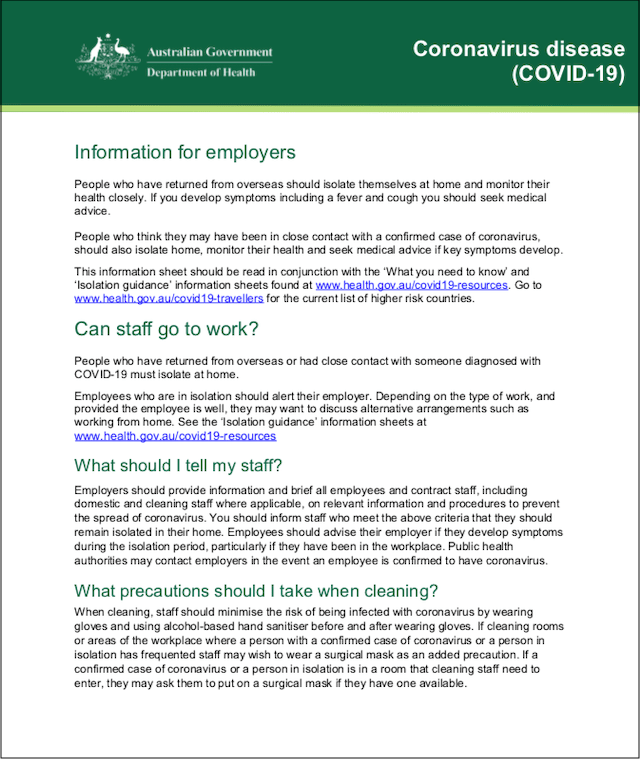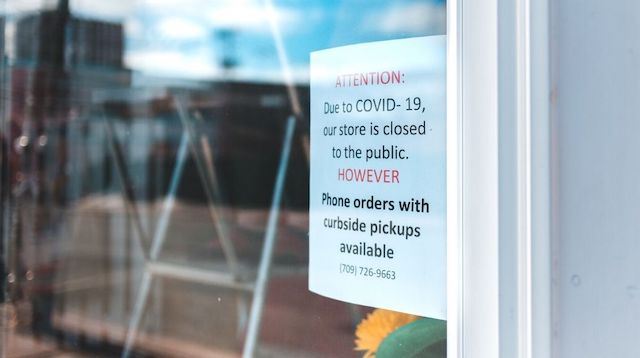UPDATE: This post on the global economic crisis was originally published on 25 March 2020 and updated on 3 April 2020.
It’s official: here in Australia as elsewhere around the world, life as we know it is on hold. With everyone being urged to stay inside, small businesses are struggling to keep the cash flowing. This post will address what small business owners can expect in the coming weeks and how some Australian businesses are adapting to the global economic crisis caused by coronavirus (COVID-19).
First the good news: The JobKeeper Payment program offers employers and the self-employed fortnightly payments of $1,500 per eligible employee.
The stimulus measures passed by Parliament also give small and medium businesses:
- As much as A$100,000 to boost cash flow
- Loan guarantees
- Support for apprentices
- Doubling of unemployment benefits
- Temporary relief for financially distressed businesses
In addition, the government offers specialized help to sole traders and companies.
As we find ourselves in an unprecedented situation with COVID-19, we’ve compiled a list of resources to help you manage your business through what promises to be a global economic crisis.
In the coming months, people around the world will be conducting business differently. Consumers will be delaying purchases, but the money is still there. The following resources will help you adapt your small business to weather the storm.
What small businesses must plan for
Here are some impacts you can expect, if your small business hasn’t already begun to see them:
- Cash flow challenges.
- Employee safety issues and absenteeism.
- Customer fears.
- Supply chain disruptions.
Once you’ve scanned our list, keep reading for details on what the government is doing to help as well as examples of the creative ways Aussie businesses are responding.
1. Cash flow challenges
With Prime minister Scott Morrison urging Australians to cancel all non-essential travel and to practice social-distancing, small businesses are already noticing a decrease in sales.

Photo: Brittani Burns on Unsplash
But financial hardship can be reduced by planning for the global economic crisis now.
Surviving a pandemic requires a cool head and willingness to adapt to changing needs and restrictions.
It’s not too late, and measures taken now could help prevent a cash flow crisis.
Here is a list of the most urgent to-dos:
- Check inventory and manage stock that has expiration dates
- Reduce ordering of items you won’t be able to sell
- Increase products that will be in demand
- Step up your promotions of your business and products
- Invoice for goods or services sold immediately
- Look at past due accounts and request immediate payment
We’ll look more closely at the Australian Government stimulus package and cash flow assistance program in the next section.
2. Employee safety issues and absenteeism
Keeping employees safe and preparing your businesses if they need time-off is at the forefront of everyone’s mind. If you can run your business remotely with employees working from home, take advantage of this option. A growing list of companies are doing it.
Have workers who’ve been diagnosed with the coronavirus? Let them know they may qualify for income support if they do not have any employer leave entitlements.
If you must close your business even temporarily, be sure to let workers know that:
- Australia’s unemployment allowance has been doubled.
- The government is providing a one-off $750 tax-free stimulus payment to welfare recipients, including pensioners, carers, veterans, families, young people and job seekers.
- The worst-hit workers will be allowed to access pension savings early.
By letting employees know about the resources available to them, you can reduce their anxiety.
Useful resources to share

Source: Department of Health
Fair Work Ombudsman has a special section on their website dedicated to workplace laws, entitlements and obligations. It answers questions such as “when can employees be stood down without pay?” and suggests how to handle leaves if workers must stop working to care for children.
Safe Work Australia offers guidance on how to prevent, prepare and take action at work during the coronavirus pandemic.
For mental health help, share these phone numbers with your staff:
- Beyond Blue 24/7 hotline is (1300 22)
- Lifeline (13 11 14)
- Headspace for ages 12-25 (1800 650 890)
The Victorian Chamber Workplace Relations Advice Line is available for Victorian businesses at 03 8662 5222.
3. Customer fears
Surviving a pandemic requires everyone’s cooperation. To date, the government has closed businesses ranging from pubs to markets and restricted hairdressers, personal trainers — it's even restricted the number of people who may attend weddings and funerals. Cafes and restaurants are takeaway only. Check this updated list for the latest on what's considered an essential business.
The newly unemployed have been forming long queues outside welfare-support offices.
Your customers want to hear from you during these uncertain times. Send an email to them telling them you’re still trading and what you’re doing to keep your workplace safe. Share updates and announcements on your Facebook and Twitter feeds, as well as any other social networks where you have active profiles.
Be open with customers:
- If you have plenty of stock, let them know
- If there is a delay, be honest with expected dates
- If you’re able to offer a service to help them during a time of need, reach out
This post explains how to keep in touch with customers in the age of social distancing.
4. Supply chain disruptions
According to a recent report by Deloitte, the pandemic has exposed the supply chain vulnerabilities of those “who have a high dependence on China to fulfil their need for raw materials or finished products.”

To address supply chain disruptions you may be experiencing now, consider the following for your business:
- Check agreements with suppliers
- Communicate any changes to your ordering amounts and schedules
- Negotiate instalment plans
- Connect with alternative suppliers
- Set customer limits to reduce the scarcity of essential products
You might also need to find product substitutes or new forms of transport. Consider promoting alternate products/services you have in stock over those with low/no stock.
What the government is doing to help
Australia’s Parliament rushed through a second round of more than A$80 billion in fiscal stimulus at a special sitting in Canberra on Monday 23 March. As mentioned earlier, the Coronavirus Economic Response Package Omnibus Bill 2020 includes as much as A$100,000 for small businesses, plus loan guarantees, support for apprentices and a doubling of unemployment benefits. The JobKeeper Payment program was announced on 30 March.
In all, Australia’s government and central bank have unleashed A$189 billion in fiscal stimulus — equal to 9.7% of the country’s gross domestic product.
Here are the particulars as they relate to small business:
- Small and medium-sized businesses will be able to access up to $25,000 through the Australian Tax Office (ATO) to help pay for employee wages and salaries.
The amount of money that your business may receive is based on the tax you pay on wages and your business activity statement (BAS). You won’t be awarded a flat $25,000, so it’s wise to talk to your tax agent.
Note that this does not extend to sole traders who do not have employees.
- Interest rates are at a record 0.25% and the Reserve Bank of Australia is committed to keeping three-year government bond yields at the same level.
- The central bank has created a term funding facility of at least A$90 billion to support business credit.
In a related move, the government is investing up to A$15 billion to spur business and consumer lending by smaller lenders.
Related: Seeking small business loans in Australia?
Immediate help for small businesses

Photo: Erik Mclean on Unsplash
The following initiatives have been created to help businesses stay alive during this unsettling time.
The JobKeeper Payment program
Under this program, affected employers can claim a fortnightly payment of $1,500 per eligible employee from 30 March 2020, for a maximum period of six months. This is available to both employers and sole traders.
Short-term changes in the Instant Asset Write-Off (IAWO)
Australia’s IAWO program has been:
- Increased from $30,000 to $150,000
- Expanded to include businesses with aggregated annual turnover of less than $500 million (up from $50 million)
This applies from 12 March 2020 until 30 June 2020, for new or second‑hand assets first used or installed ready for use in this timeframe.
Cash flow assistance
This relief program is two-pronged:
- A minimum of $2,000 and maximum of $25,000 to eligible businesses, delivered as a credit to the business upon lodgment of their activity statements. The payment will be tax-free.
- Wage subsidies of 50% of wages paid during the nine months from 1 January 2020 to 30 September 2020 to enable small businesses to keep apprentices and trainees working.
Read this fact sheet for eligibility and application details.
Affected regions, communities and industries
The government has allocated $1 billion to shore up industries particularly hard-hit by the coronavirus. These include:
- Tourism
- Agriculture
- Education
This includes waiving environmental management charges, as well as entry fees at Commonwealth National Parks and other efforts to increase domestic tourism.
In addition, the government has established an International Freight Assistance Mechanism to back Australia’s agriculture and seafood export sectors.
Assistance offered by the Australian Tax Office
The ATO has an Emergency Support Infoline: 1800 806 218. Assistance will not be automatically offered as it was with Bushfire Relief, so it’s worth a call to see how your business can benefit.
Here are the major forms of small business help to ask about:
1. Deferred payment up to four months

To temporarily lighten the load, the ATO has deferred all:
- Business activity statements (BAS)
- Pay As You Go (PAYG) instalments
- Income tax assessments
- Fringe benefits tax assessments
- Excise taxes
Please note that during this time, you are still required to meet your super guarantee obligation for all your employees.
2. Change GST from quarterly to monthly
If you’re currently paying Goods and Services Tax (GST) quarterly, you may be able to change to monthly for quicker access to any GST refunds you may be entitled to.
3. Vary your PAYG instalments
You may be able to vary your PAYG amounts to zero for the March 2020 quarter.
4. Options for low-interest payment plans for existing or future tax debts
The ATO encourages you to get in touch with them to discuss your options and how they can best help your business. For more information, visit the ATO website.
Providing accurate COVID-19 information
For the most up-to-date information, rely on trusted websites rather than social media. Your state’s government health site is the best place to stay informed, so you can keep your workplace calm and safe.
ACT Health
NSW Department of Health
Northern Territory Department of Health
Queensland Department of Health
South Australia Department of Health
Tasmania Department of Health
Victoria Department of Health
Western Australia Department of Health
Share these links in Facebook posts and emails, so your customers and their families will have reliable information about how to protect themselves and slow the spread of COVID-19.
Examples of businesses adapting to crisis
In the past month, local businesses big and small have used unconventional means to continue serving their customers. With a focus on the customers’ needs, these efforts may not generate a profit in the short-term but will be a smart investment for future sales.

Any company that goes above and beyond to adapt their business model in order to help customers through this uncomfortable period will make a lasting impression.
Live streaming
The Melbourne Symphony Orchestra is keeping the music alive by live-streaming performances via their YouTube channel for free.
Gift vouchers
Blueys Restaurant in Nelson Bay has made their entire menu available for takeaway and is promoting gift certificates for future visits. They aren’t shy about telling customers that they need their support now so they can continue to pay their employees.
Free delivery
The Little Bookroom, a local bookshop in Melbourne, is offering free local delivery for those who are self-isolating.
Click and collect

The Coffee Apple toy store is a family-owned business. They reserved two parking spaces so customers can buy items online or over the phone and pick up without entering the store.
Waiving fees
Qantas and Jetstar are relaxing their cancellation policies.
Changing return policies
Woolies and Coles are tightening their limits and return policy to prevent over-purchasing and supply shortages.
Altering opening hours
Woolies and Coles are also designating special hours for high-risk residents to shop without the crowds. In addition, they are shutting early to clean and restock shelves properly.
Offering free services
Loom is slashing subscription prices and offering their video service to teachers and students free (for life).
Zoom storytime
Instead of cancelling storytime, Diamond Valley Library is reading to children via Zoom video.
We will get through this global economic crisis
As Australians, we appreciate and value local businesses. We know that buying local means we’re supporting a local family and making our community stronger.

Don’t be shy about telling your customers that you need their support during this time.
From drought to bushfires to surviving a pandemic, you don’t have to go it alone, and customers want to help you.
Tips on weathering the storm:
- Spend your energy taking care of your current clients
- Tell customers what products and services you have available
- Offer services to help them buy from you without leaving their home
- Don’t go quiet. Customers want to hear from you even if they aren’t ready to buy
- Empathise. We’re all going through this together
- Be open with your employees and offer mental health breaks
- Don’t panic
If you didn’t find what you need here, contact your local Chamber of Commerce or Council for help.
Information was accurate as of the time of publication. Consult the government website for up-to-the-minute changes.
GoDaddy Editor Cate Barker contributed to this post.








